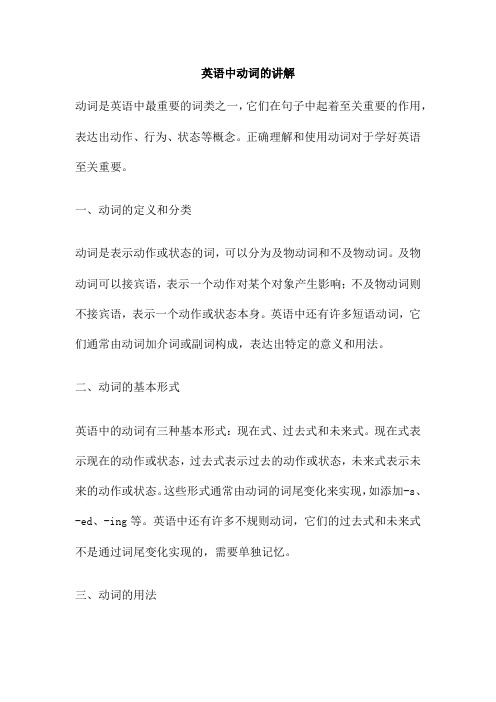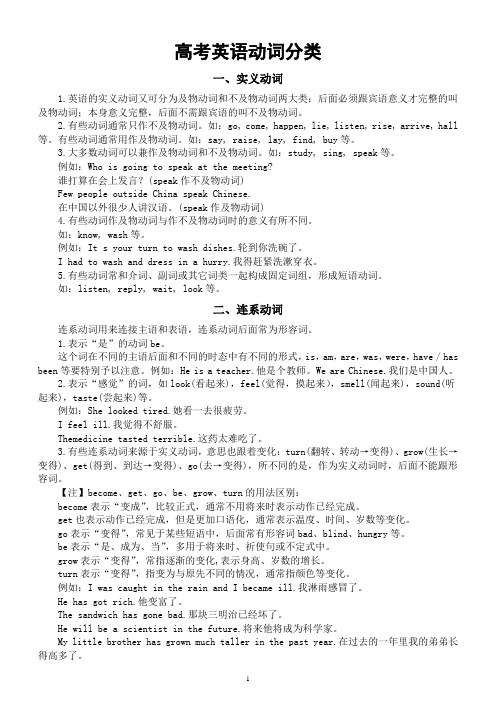高考英语动词分类讲解.doc
高考英语重难点语法讲解 非谓语动词

高考英语重难点语法讲解非谓语动词高考英语重难点语法讲解-非谓语动词高中语法——非限定动词一、非谓语动词种类在英语中,不充当句子谓语但具有除谓语以外的其他语法功能的动词称为非谓语动词。
非限定动词有动词不定式(theinfinitive);动名词(thegerund);现在分词(thepresentparticiple);过去分词(thepastparticiple)。
二、分类:(1)不定式的形式:主动被动一般式towritetobewritten进行式tobewriting/完成式tohavewrittentohavebeenwritten否定式not+(to)do1)一般式:不定式的一般式所表示的动作与谓语动词动作同时发生或发生在谓语动词动作之后,例如:i’mgladtomeetyou.heseemstoknowalot.weplantopayavisit.hewantstobeanartist.患者要求进行一次手术。
theteacherorderedtheworktobedone.2)进行式:不定式的进行式所代表的动作与谓语动词的动作同时发生,例如:男孩继续努力工作heseemstobereadinginhisroom.3)完成式:不定式的完成式表示动作发生在谓语动词的动作之前,例如:iregrettedtohave toldalieihappenedtohaveseenthefilm.heispleasedtohavemethisfriend.(2)动名词的形式:voice 1式一般式完成式否定式1)一般式:主动语态“什么都没做”+动名词被动语态“被看见”就是“看见”就是“相信”。
2)被动式:他没被邀请就去了派对。
他没有被邀请就来参加聚会了。
3)完成式:我们记得看过这部电影。
我们记得看过这部电影。
4)完成被动式:他在五年前卖掉了肯托广州的啤酒。
他忘了五岁时被带到广州。
5)否定:不+动名词iregretnotfollowinghisadvice.我后悔没听他的劝告。
高考英语语法非谓语动词专题讲解

高考总复习 ·英语
返回导航
语法专项提升 专题七
►I couldn't do my homework with all that noise going on. 由于噪音不断我做不了作业。 ►The girl feels excited with so many places of interest to visit. 有这么多的名胜可以参观,女孩很兴奋。
高考总复习 ·英语
返回导航
语法专项提升 专题七
►Lost in the mountains for a week, we were finally saved by the local police. 在大山里迷失了一个星期,我们最终被当地警察所救。 ►Absorbed in his book, he didn't notice me enter the room. 专心读书的他没注意到我进入了房间。 (三)现在分词作状语 1.现在分词所表示的动作与句子主语之间构成逻辑上的主动关系,且含有进行 之意。现在分词作状语可以表示时间、原因、条件、让步、结果、方式或伴随情况。
高考总复习 ·英语
返回导航
语法专项提升 专题七
►We must keep a secret of the things being discussed here. 我们必须对在此讨论的问题保密。(被动、正在进行) ►The players selected from the whole country are expected to bring us honor in this summer game. 人们期待着从全国各地挑选出来的运动员能在今年夏季的赛事中给我们带来荣 誉。(被动、完成)
高考英语精准考点 动词的分类

Give up, put into
动词+副词+介词
Catch up with, look down upon
动词+名词+介词
Take care of, pay attention to
Be+形容词+介词
Be proud of, be afraid of
复杂结构
Make up one’s mind, wind one’s way
系动词(link-v)
跟表语
不能独立做谓语,跟表语构成完整意思
I am a student.
助动词(aux. v.)
跟动词原形或分词(无词汇意义)
不能独立做谓语,跟主要动词构成谓语,表示疑问,否定及各种时态
He doesn’t speak Chinese.
I am watching TV.
情态动词(mod. v.)
跟动词原形(有自己的词汇意思)
不能独立做谓语。表示说话人语气、情态,无人称和数的变化
We can do it by ourselves.
That would be better.
第二方面:短语动词,短语动词是由一些动词和其它词构成短语,表达一个完整的意思。其构成方式如下。
构成方式
举例
动词+介词
Look at, look after
主语是动作的发生者或者承受者
We study English.主动
The road was filled with rubbish.被动
语气
说话人表达事实、要求、愿望等
He has flown to America.事实
I wish I could fly to the moon some day.愿望
高考英语常见系动词分类总结

高考英语常见系动词分类总结1.表感官的系动词:look, sound, taste, smell, feel(这些词用形容词作表语)2.表似乎的系动词seem, appear3.表变化的系动词:become, get, turn, grow, make, come, go, fall, run4.表依旧的系动词:remain, keep, stay, continue, stand, rest, lie, hold5.可带名词作表语的系动词:become, make, look, sound, fall, prove, remain, turn(该词后接的单数名词前多不用冠词。
如:He turned teacher.)6.如果读者对于这个语法现象还是不怎么理解的话,可以以这个名句为例子学学:the man who dies rich dies disgraced.在巨富中死去,是一种耻辱。
其中的rich and disgraced 是说明主语的性质的。
1)状态系动词用来表示主语状态,只有be一词,例如:He is a teacher. 他是一名教师。
(is与补足语一起说明主语的身份。
)2)持续系动词用来表示主语继续或保持一种状况或态度,主要有keep, rest, remain, stay, lie, stand, 例如:He always kept silent at meeting. 他开会时总保持沉默。
This matter rests a mystery. 此事仍是一个谜。
3)表像系动词用来表示"看起来像"这一概念,主要有seem, appear, look, 例如:He looks tired. 他看起来很累。
He seems (to be) very sad. 他看起来很伤心。
4)感官系动词感官系动词主要有feel, smell, sound, taste, 例如:This kind of cloth feels very soft. 这种布手感很软。
高考英语语法详解系列之六:动词分类和情态动词

高考英语语法详解系列之六:动词分类和情态动词【高考必考点:系动词,助动词和情态动词(80%)】动词概述:动词(verb)是表示人或事物的动作或状态的词。
动词和名词代词一样,也有人称和数的变化。
谓语动词的人称和数必须和主语的人称和数保持一致。
如:I’m going to hear John Denver.我要去听约翰•丹佛的演唱会。
The CCTV has been broadcasting English programmes ever since 1977.自从1977年到现在,中央电视台就一直在播放英语节目。
动词的种类根据动词在句子中的作用,可将动词分为实义动词(Notional Verb),系动词(linking Verb),助动词(Auxiliary Verb)和情态动词(Modal Auxiliary Verb)。
1. 实义动词实义动词有词义,能够在句中单独作谓语,表示句子主语的动作或情况。
如:She dances well.她的舞跳得好。
He often helps me.他经常帮助我。
实义动词又有及物动词(Transitive Verb)和不及物动词之分(Intransitive Verb)。
及物动词就是要求该动词后跟有宾语。
如:We all love our great motherland.我们都热爱我们伟大的祖国。
He h ad a big breakfast this morning.今天早晨他吃了一顿丰盛的早餐。
不及物动词就是该动词后不要求跟宾语。
如:He is swimming.他正在游泳。
The plane takes off at 8:30.飞机八点三十分起飞。
许多动词既是及物动词又是不及物动词。
如:She writes well.她写得好。
She is writing a letter.她正在写一封信。
We must learn from Lei Feng.我们要向雷锋学习。
英语中动词的讲解

英语中动词的讲解动词是英语中最重要的词类之一,它们在句子中起着至关重要的作用,表达出动作、行为、状态等概念。
正确理解和使用动词对于学好英语至关重要。
一、动词的定义和分类动词是表示动作或状态的词,可以分为及物动词和不及物动词。
及物动词可以接宾语,表示一个动作对某个对象产生影响;不及物动词则不接宾语,表示一个动作或状态本身。
英语中还有许多短语动词,它们通常由动词加介词或副词构成,表达出特定的意义和用法。
二、动词的基本形式英语中的动词有三种基本形式:现在式、过去式和未来式。
现在式表示现在的动作或状态,过去式表示过去的动作或状态,未来式表示未来的动作或状态。
这些形式通常由动词的词尾变化来实现,如添加-s、-ed、-ing等。
英语中还有许多不规则动词,它们的过去式和未来式不是通过词尾变化实现的,需要单独记忆。
三、动词的用法动词在不同的语境中有不同的用法。
在陈述句中,动词通常出现在主语之后,表示主语进行的动作或状态。
在疑问句中,动词通常出现在主语之前,表示询问主语进行的动作或状态。
在否定句中,动词之前加上not或never等否定词,表示否定或拒绝的动作或状态。
动词还可以用于祈使句中,表示请求或命令的动作或状态。
四、动词的搭配英语中的动词有许多固定的搭配,这些搭配通常由动词和介词、副词等组成。
例如,look at表示看某物,go to表示去某个地方,listen to表示听某个声音。
这些搭配不仅表达出特定的意义和用法,也体现了英语的习惯用法和语言文化。
英语中的动词是理解和使用英语的关键之一。
通过掌握动词的分类、基本形式、用法和搭配等方面,可以更好地理解和运用英语语言。
情态动词是英语语法中的重要部分,它们表达了说话者的意愿、可能性和判断。
掌握好情态动词的使用对于理解和使用英语至关重要。
在这篇文章中,我们将详细讲解高中英语中的情态动词。
情态动词是用来表达情态的动词,它们描绘了说话者的感情、态度或观点。
情态动词可以分为三类:可能性情态动词、义务情态动词和愿望情态动词。
高考英语动词 按频次分类

高考英语动词(按频次分类)一、★★★★★promise ignore prepare realize expect change receive explain imagine introduce doubt appreciate relieve comfort admit move encourage surprise hesitate break disappoint amuse confuse challenge accept annoy excite believe offer afford practice learn二、★★★★bring leave perform valuecall interest survive visit attract lose puzzle waste describe notice shock waitcopy invite show wonder enjoy instruct prevent worryfail improve predict understand concern memorize regret use convince hold teach recognize educate comment refuse advise dream approach remind correct frighten cover struggle agree catch discover share exchange三、★★★create inform report whisper feel inspire smile warn admire hit pass workcriticize increase think witness continue hide object wave demand influence pause urge depend impress praise whistle deliver include push volunteer carry maintain pull vary deal lead rescue view cheer lend save upset beg injure serve update amaze join observe welcome direct indicate reserve wear announce hire trust weep confirm interrupt pretend weigh accompany nod respond wipe choose hate raise withdraw celebrate lift rise wander declare intend study unite experience invent recommend vote delay mind reason underline collect matter seize resist fetch misunderstand suit supply award mislead reward touch contact mistake tour travel contrast hurt start return glance judge occupy resign glare mean train require grasp match spread throw contribute happen scold purchase design meet suggest qualify defeat lie press operateconnect measure permit satisfy devote handle progress separate adopt hurry possess panic adapt interview oppose state force limit retire strike calm hand owe stick balance forget own overlook drag dive reach overlap advertise divide search select apply complain research stare guide bother slide sweep attempt apologize slip scratch allow appeal rush scream crash appear prove produce discourage forgive organize starve applaud assume skip scare approve embarrass skim scan appoint attain result turn delete gain sign shout communicate explore sigh shut decide affect relax spend guess express reject prefer determine fire struggle treat avoid adjust pollute tolerate elect guarantee quit refresh exist achieve question recite enrich cancel request occur chat form store spot check develop surround replace classify extend master rememberclarify donate overcome support attach contain persuade recover attack destroy preview respect borrow damage obey succeed consider arrange order protect drop envy paint shake greet excuse place thrill count control polish reflect discount cause pray participate add argue print recommend care compare publish present clear compete punish rungrow complete quarrel rateequal fit pour rent deserve charge recycle record bless breathe reduce referdiffer forbid regard register blame adore repeat review bear desire ruin riskfigure foresee rely robfold desert simplify sense absorb consist step sinkdeny assess swap sponsor focus direct swear shine disturb behave trap shoulder digest consult track hugclaim divorce tend skate blame convey suspect sob exchange consume sweep sail adventure abandon send score四、★★。
高中英语高考动词分类汇总(共四大类)

高考英语动词分类一、实义动词1.英语的实义动词又可分为及物动词和不及物动词两大类:后面必须跟宾语意义才完整的叫及物动词;本身意义完整,后面不需跟宾语的叫不及物动词。
2.有些动词通常只作不及物动词。
如:go, come, happen, lie, listen, rise, arrive, hall 等。
有些动词通常用作及物动词。
如:say, raise, lay, find, buy等。
3.大多数动词可以兼作及物动词和不及物动词。
如:study, sing, speak等。
例如:Who is going to speak at the meeting?谁打算在会上发言?(speak作不及物动词)Few people outside China speak Chinese.在中国以外很少人讲汉语。
(speak作及物动词)4.有些动词作及物动词与作不及物动词时的意义有所不同。
如:know, wash等。
例如:It s your turn to wash dishes.轮到你洗碗了。
I had to wash and dress in a hurry.我得赶紧洗漱穿衣。
5.有些动词常和介词、副词或其它词类一起构成固定词组,形成短语动词。
如:listen, reply, wait, look等。
二、连系动词连系动词用来连接主语和表语,连系动词后面常为形容词。
1.表示“是”的动词be。
这个词在不同的主语后面和不同的时态中有不同的形式,is,am,are,was,were,have / has been等要特别予以注意。
例如:He is a teacher.他是个教师。
We are Chinese.我们是中国人。
2.表示“感觉”的词,如look(看起来),feel(觉得,摸起来),smell(闻起来),sound(听起来),taste(尝起来)等。
例如:She looked tired.她看一去很疲劳。
I feel ill.我觉得不舒服。
- 1、下载文档前请自行甄别文档内容的完整性,平台不提供额外的编辑、内容补充、找答案等附加服务。
- 2、"仅部分预览"的文档,不可在线预览部分如存在完整性等问题,可反馈申请退款(可完整预览的文档不适用该条件!)。
- 3、如文档侵犯您的权益,请联系客服反馈,我们会尽快为您处理(人工客服工作时间:9:00-18:30)。
高考英语热点动词十五类动词是英语中最活跃的词类,是句子的核心成分。
此外,英语动词的变化较多,形式颇为复杂,是英语学习的难点之一。
历届高考英语试题常把动词作为测试的重点,在单项填空题中所占比例在50%以上。
笔者通过对近十年来的高考英语试题进行分析,归纳常考动词十五类,供大家参考。
一、连系动词类连系动词按其所表示的意义可分为以下四种:1.变化类表事物发展变化的过程,如become, go, turn, grow, get, fall等。
2.感觉类表人体部位的感受,如feel, smell, taste, look, sound等。
3.状态类表事物所处的状态,如keep, come, run, remain, stand, lie, stay, prove等。
4.外表特征类表外表给人的印象,如appear, seem, look等。
连系动词的作用是后接形容词或相当于形容词的结构作表语。
除了少数几个(如feel, get, become, grow等)外,不用于进行时态和被动结构。
例如:The mixture is tasted terrible.(误)The mixture tastes terrible(正)Jim pretended to be falling asleep when his mother came in.(误)Jim pretended to fall /be asleep when his mother came in.(正)I'm feeling much better than ever before.It was getting darker and darker. Besides, a cold rain began to fall.【高考例题】(1) ---Do you like the material? ---Yes, it ____ very soft. (NMET94)A. is feelingB. feltC. feelsD. is felt(2) Why don't you put the meat in the fridge? It will ____ fresh for several days. (NMET 03)A. be stayedB. stayC. be stayingD. have stayed(3) The pilot asked all the passengers on board to remain ____ as the plane was making a landing. (04春季高考上海卷)A. seatB. seatingC. seatedD. to be seating(4) Be careful when you cross this very busy street. If not, you may ____ run over by a car. (02高考北京卷)A. haveB. getC. becomeD. turn(5) Happy birthday, Alice. So you have ____ twenty-one already. (04天津卷)A. becomeB. turnedC. grownD. passed(6) Sarah, hurry up. I'm afraid you can't have time to ____ before the party. (04全国卷II)A. get changedB. get changeC. get changingD. get to change(7) 0n hearing the news of the accident in the coal mine, she ____ pale. (04湖北卷)A. gotB. changedC. wentD. appeared(8 )The flowers ____ sweet in the botanic garden attract the visitors to the beauty of nature. (04上海卷)A. to smellB. smellingC. smeltD. to be smelt(9) Although he has taken a lot of medicine, his health ____ poor. (02春上海卷)A. provesB. remainsC. maintainsD. continues(10) I love to go to the seaside in summer. It ____ good to lie in the sun or swim in the cool sea.A. doesB. feelsC. getsD. makes(Key: CBCBB ACBBB)二、感官动词类常考的感官动词有see, watch, notice, observe, hear, feel, find, catch等。
感官动词的主要作用是后接非谓语动词的不同形式作宾语补足语,表达不同的含义。
1.后接不带to的不定式表示一个发生过或者还没发生具体的动作。
I often heard the song sung, but I have never heard you sing it.When you go to watch the football watch, you will enjoy seeing the Chinese football team win.2.后接V-ing形式表正在进行的动作。
Seeing the sun rising above the surface of the sea, we let out a shout of joy.Hearing this, I felt my heart beating fast.3.后接V-ed形式表被动意义。
After his return twenty years later, he found his home town greatly changed.Although I had learnt some English, I had never heard a word of it spoken.【高考例题】(1) The managers discussed the plan that they would like to see ____ the next year. (NMET 2000)A. carry outB. carrying outC. carried outD. to carry out(2) A cook will be immediately fired if he is found ____ in the kitchen. ( NMET 03)A. smokeB. smokingC. to smokeD. smoked(3) The missing boys were last seen ____ near the river.A. playingB. to be playingC. playD. to play(4) The salesman scolded the girl who was caught ____ and let her off. (NMET93)A. to have stolenB. to be stealingC .to steal D. stealing(5) He looked around and caught a man ____ his hand into the pocket of a passenger.A. putB. to be puttingC. to putD. putting (04春北京卷)(Key: CBADD)三、使役动词类表“致使”意义的动词称之为使役动词,如make, let, have, keep, leave, set, send等。
使役动词的作用是后接非谓语动词的不同形式作宾语补足语,表达不同的含义。
分以下三种情况:1. make, let have等后接不带to的不定式,表“使/让某人/某物做某事”。
Don't make him do it if he doesn't want to.If you have any problems, just let me know.在被动结构中不定式须带to,但是have不用于被动结构中.He was made to apologize to the guest.2. have, keep, leave, send, set, get等后接V-ing形式,表持续性动作。
I'm sorry to keep you waiting for so long.Why do you have him worrying about his lessons?3. have, keep, leave等后接V-ed形式,表被动含义。
He didn't keep on asking me the time until he had had his watch repaired.I'll keep you informed as soon as I have the news.【高考例题】(1)Don't leave the water_while you brushyour teeth. (04天津卷)A. runB. runningC. being runD. to run(2)Laws that punish parents for their children's actionsagainst the laws get parents_.(04重庆卷)A. worriedB. to worryC. worryingD. worry(3) ---Why did you go back to the shop?---I left my friend ____ there. (03春安徽内蒙古卷)A. waitingB. to waitC. waitD. waits(4) It was so cold that they kept the fire ____ all night. (NMET91)A. to burnB. burnC. burningD. burned(5) ---Good morning, can I help you?---I'd like to have this package ____,madam.A. be weighedB. weighingC. weighedD. to weigh (NMET89)(6) The speaker raised his voice but still couldn't make himself ____.(NMET91)A. hearB. to hearC. hearingD. heard(7) As you have never been there before, I'll have someone ____ you the way. (94上海卷)A. showB. to showC. showingD. showed(8) Paul doesn't have to be made ____.He always works hard. (NMET95)A. learnB. to learnC. learnedD. learning(9) A computer can do only what thinking people ______.(99上海卷)A. have it doB. have it doneC. have done itD. having it done(10) Mrs. Brown was much disappointed to see the washing machine she had had ____ went wrong. (98年上海卷)A. itB. it repairedC. repairedD. to be repaired(Key: BCACC DABAC)四、含情感色彩的动词这类动词有excite, inspire, encourage, interest, satisfy, delight, please, move, frighten, surprise, amaze, astonish, shock, worry, astonish, disappoint, discourage, exhaust, puzzle, tire, terrify等。
